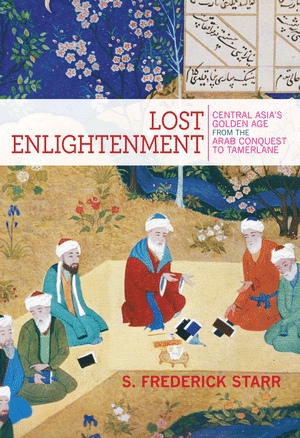 As anyone who reads a lot Asian history knows it is really hard to find a current comprehensive history of Central Asia in the middle ages. Not surprising when you consider the area encompasses about 2 million square miles, hundreds of years of history and countless cultures many of which disappeared without much trace. There are countless books on that great trading network, the Silk Road, but these, like the traders who traveled it, move across the landscape never settling in one region long enough for the reader to get to know it. So when Starr’s Lost Enlightenment came out I had to read it.
As anyone who reads a lot Asian history knows it is really hard to find a current comprehensive history of Central Asia in the middle ages. Not surprising when you consider the area encompasses about 2 million square miles, hundreds of years of history and countless cultures many of which disappeared without much trace. There are countless books on that great trading network, the Silk Road, but these, like the traders who traveled it, move across the landscape never settling in one region long enough for the reader to get to know it. So when Starr’s Lost Enlightenment came out I had to read it.
The book in many ways is a crusade to make the world aware of the greatness that was Central Asia. That region made up of what are today some of the poorest countries on earth – Kazakhstan, Kyrgyzstan, Tajikistan, Turkmenistan, Uzbekistan and Afghanistan – was once a hub of wealth, power and intellectual achievement that dwarfed anything Europe could boast. In fact much of the Greek writing that sparked the European Renaissance, once thought by scholars to have been rediscovered through the work of Arab translators, was in fact translated by Central Asian scholars writing in Arabic. It was Central Asians that first popularized the use of the Indian numeric system which we use today and the concept of the Zero long before Arabs and Europeans. The work also highlights the great engineering achievements that allowed Central Asians to create irrigated urban centers out of the desert and stepp.
Although the focus of the book is for the most part on intellectual history and the scholarly achievements of Central Asia, Starr still manages to give his readers a sense of the life and politics of the region. The reader also gets a front row seat for the endless series of invaders that came to the area over the centuries. After the last of these, the Arabs, he focuses on the cultural and political tensions between Arabs overlords and their always restive Central Asian subjects.
If the book has a fault it is the author’s deep passion for his subject. At times it reads like a laundry list of achievements: and then the Central Asians did this and then the Central Asians did that. It can get a bit repetitive. Even so it is still easy to read and makes a history not known by most Americans easily accessible.
Check Out the First Chapter or this interview with the author on the RumiForum.



Thanks for sharing. He must be quite up there in age.